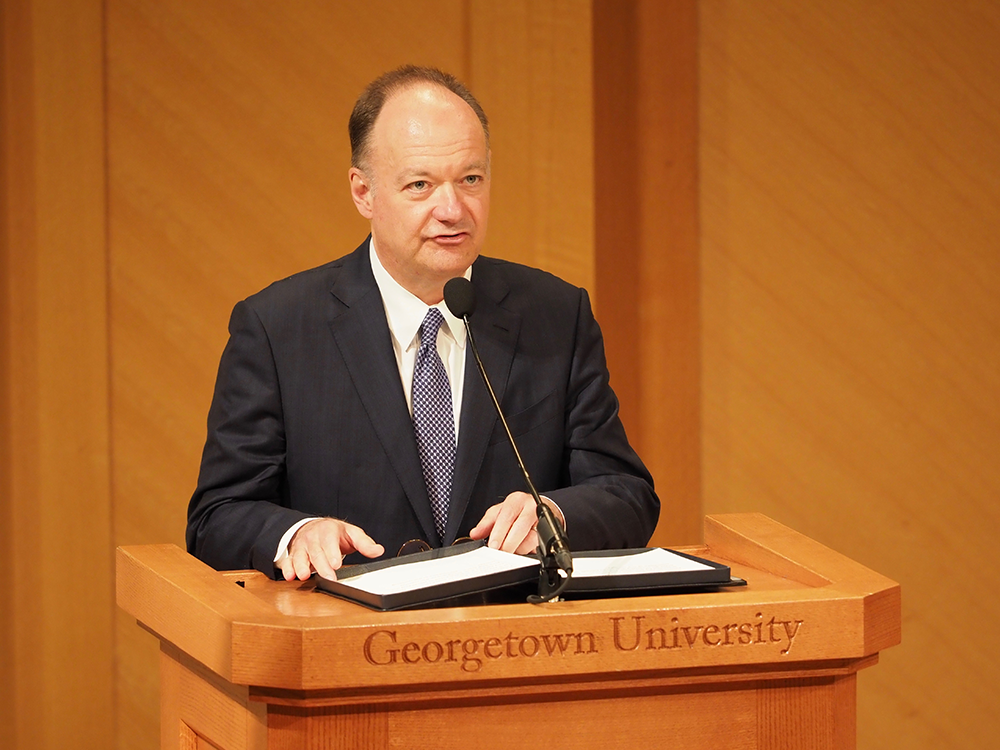Georgetown University joined over 100 other academic institutions in signing an amicus brief to the United States District Court for the District of Columbia in support of temporary employment authorization for international students Nov. 25.
The Optional Practical Training program, managed by the Department of Homeland Security, grants international students a yearlong extension to their F-1 student visas to pursue professional opportunities related to their fields of study. The brief supports an extension to the program for STEM students, which a labor union challenged as unconstitutional in 2016.

The opportunity for international students to continue their education through firsthand training is a vital part of the student experience, according to Rachel Rubin, director of International Student and Scholar Services at the Office of Global Services.
“Georgetown is a global community — one made stronger by our religious, cultural and international diversity. Georgetown firmly believes in the power that comes from our students bringing knowledge gained in a classroom into real-world experiences,” Rubin wrote in a statement to the Hoya. “The opportunity to undertake internships, employment, or research is critical to student success after leaving Georgetown.”
International students are required to hold an F-1 visa to study at any college or university in the United States. Upon graduation, F-1 visa holders can apply for the OPT program. In 2016, President Barack Obama changed DHS regulations to add the OPT-STEM program, which allows international students who work in STEM fields to extend a general OPT program for an additional two years.
The Washington Alliance of Technology Workers, a labor union, sued the DHS in 2016, alleging that the program unfairly causes U.S. workers to compete with foreign workers within the STEM industry.
International students in the OPT-STEM program contribute to the U. S. economy and advances science and technology efforts across the country, according to Heather Stewart, director of immigration policy for NAFSA: Association of International Educators, an international student advocacy organization.
“Our nation’s economy and educational institutions are undeniably enriched by the presence of talented, diverse, and motivated international students and OPT is a key factor in attracting those very students,” Stewart wrote in an email to The Hoya. “The U.S. is now in a global competition for international students and scholars. To ensure that we continue to benefit from these individuals and their investments in our communities, we must maintain this time-tested program.”
The lawsuit against the OPT-STEM program was first brought to the United States District Court for the District of Columbia in 2016 in the lawsuit Washington Alliance of Technology Workers Union vs. U.S. Department of Homeland Security. In 2019, a judge ruled that the case against the program could move forward after inaction on the case for three years.
If judges were to rule in favor of the challenge, universities and colleges in the United States could expect to see international student enrollment decrease because international students would only be able to extend their F-1 visas for up to a year after their graduation, according to Law 360, a legal news service.
The OPT-STEM program must continue, so international students have the opportunity to find employment after graduation, according to Rimpal Bajwa (SFS ’22), activism committee leader for Hoyas for Immigrant Rights.
“International students are kind of at a disadvantage when it comes to the job market because after graduating, their visa expires, and the company they work for has to sponsor them for a work visa,” Bajwa said in an interview with The Hoya. “This is an additional step most companies aren’t willing to take. OPT allows international students to not only gain an education, but allows them to translate the skills they’ve learned in the classroom to actual work environments.”
Continuing the OPT-STEM program will ultimately benefit scientific research in the United States, according to Stewart.
“Attracting international students and scholars is an important way that the United States grows its knowledge economy,” Stewart wrote. “The countries that create the most attractive environment for the world’s finest scientists will do the most to enhance their scientific leadership. Indeed, the very diversity that we gain through openness to international talent itself fuels innovation and creativity.”




















